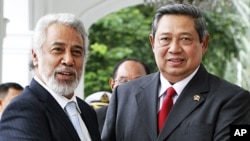Indonesia's unreserved support for East Timor's membership to the Association of Southeast Asian Nations reinforces the growing ties between two countries that were on opposite sides of a struggle for independence, a little more than a decade ago. Economic interests, democratic development and geopolitical realities have helped both countries overcome the past.
Indonesian Foreign Ministry spokesman Michael Tene uses the word "neighbor" to connote both equal status and a close relationship, in describing his country's support for East Timor's membership in ASEAN.
Growing relationship
"East Timor is our neighbor and, likewise, we have to work together as good neighbors,” Tene said. “And, there are many occasions in which the interests of Indonesia and East Timor's are in line."
But it was only in the last decade that the relationship between these neighbors turned positive. Prior to that, East Timor was not a country but a province of Indonesia. In 1975, during the rule of military strongman President Suharto, the Indonesian military took control of the former Portuguese colony and occupied it for 24 years. In 1999, after the fall of Suharto, Indonesia allowed the East Timor people to vote for independence. The United Nations-backed referendum passed overwhelmingly, but Indonesian-backed militias responded by ransacking the country and killing an estimated 1,400 people.
In 1999, Dewi Fortuna Anwar was the spokesperson for then-president of Indonesia B.J. Habibie, who supported East Timor's independence. Today, she is the research director at the Habibie Center think tank. She says that as East Timor - or Timor Leste - was transitioning to an independent country, Indonesia was transitioning to a democracy and, by 2002, relations between the countries were on the mend.
Move beyond past history
"Immediately after the transfer of power from the United Nations to Timor Leste, the Indonesian president, President Megawati attended the celebration in East Timor and the process of reconciliation really started from its earliest stage in 2002,” Anwar said. “And, from that time onward, both Jakarta and Dili have worked very hard to put the history behind us."
She says the fact that, unlike Indonesia, East Timor was never a Dutch colony was an important distinction in the minds of most Indonesians and was a rationale for accepting independence. She says other Indonesian provinces are looked upon differently, because they have been part of Indonesia since independence.
The newly independent East Timor, impoverished and with a population of approximately one million people, has embraced Indonesia's support. But it has not forgotten the past. Lan Shiow Tsai, who works on East Timor governance issues with the human rights and development organization Access to Justice Asia, says the growing economic ties between the two countries have not prevented East Timor from seeking justice for the past.
"It's not an attempt to play down the crimes committed during the Indonesian occupation,” said Tsai. “But, rather, Timor Leste understands it is pointless for the relationship between Timor Leste and Indonesia to remain stagnant at oppressed or victim status and that it would be counterproductive to refuse cooperation."
Jointly investigating atrocities
The two countries participate in an ongoing Commission on Truth and Friendship that is charged with investigating past atrocities, although some human rights groups say the commission's powers to investigate and prosecute are too limited.
Some countries like Singapore cite East Timor's lack of development as a reason for rejecting its bid to join ASEAN. But Indonesia sees East Timor's membership in ASEAN as a means to help the country develop. This support is driven in part by investment opportunities in East Timor's vast oil and gas reserves, but Anwar says it is also in Indonesia's security interest to help its neighbor succeed.
Advancing mutual interest
"Indonesia does not want to see East Timor to continue to lag behind, because a weak East Timor would continue to be a weak underbelly for Indonesia's overall security,” Anwar added. “So it is in Indonesia's best interest to see that East Timor succeeds to become a new state and to become a center for prosperity, so that, when it engages with the outside world, it will not be to the detriment of its bigger neighbor."
And, Indonesia knows that if ASEAN does not increase political and economic ties with East Timor, China and India will.





